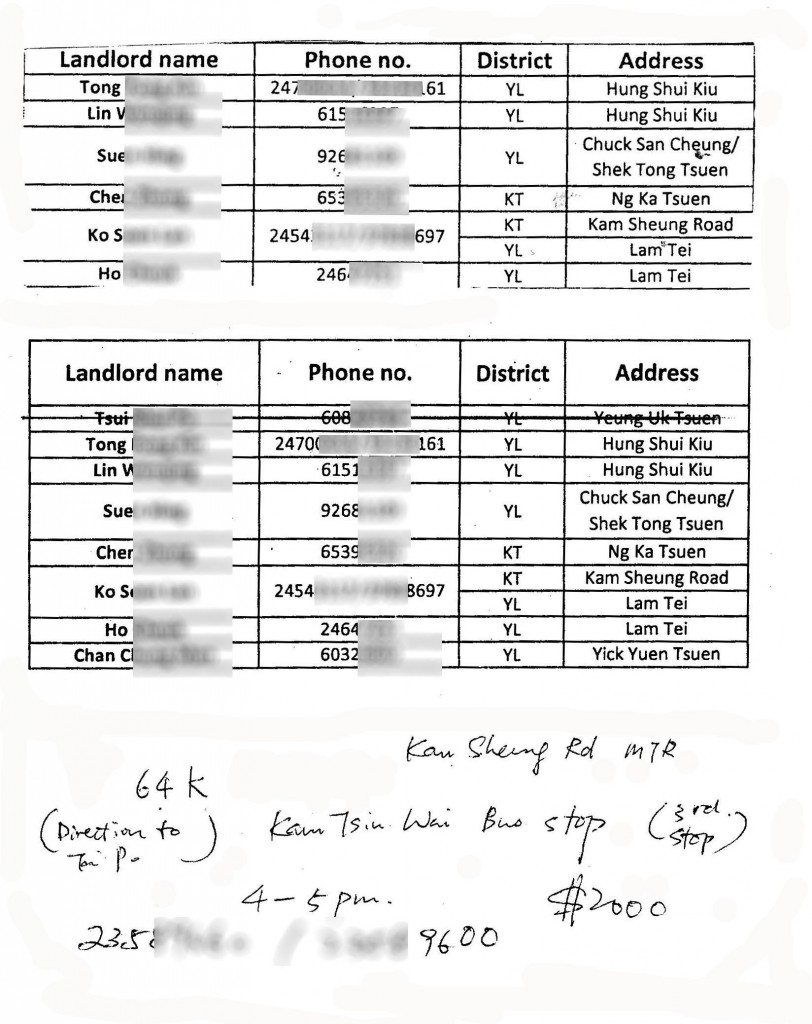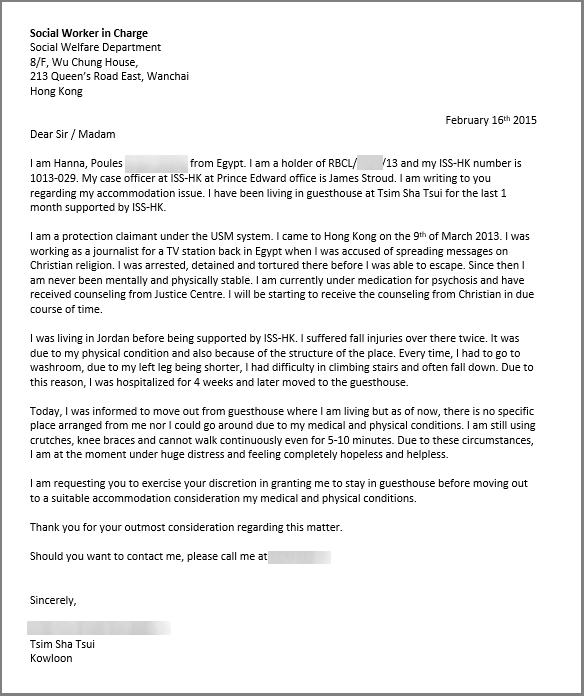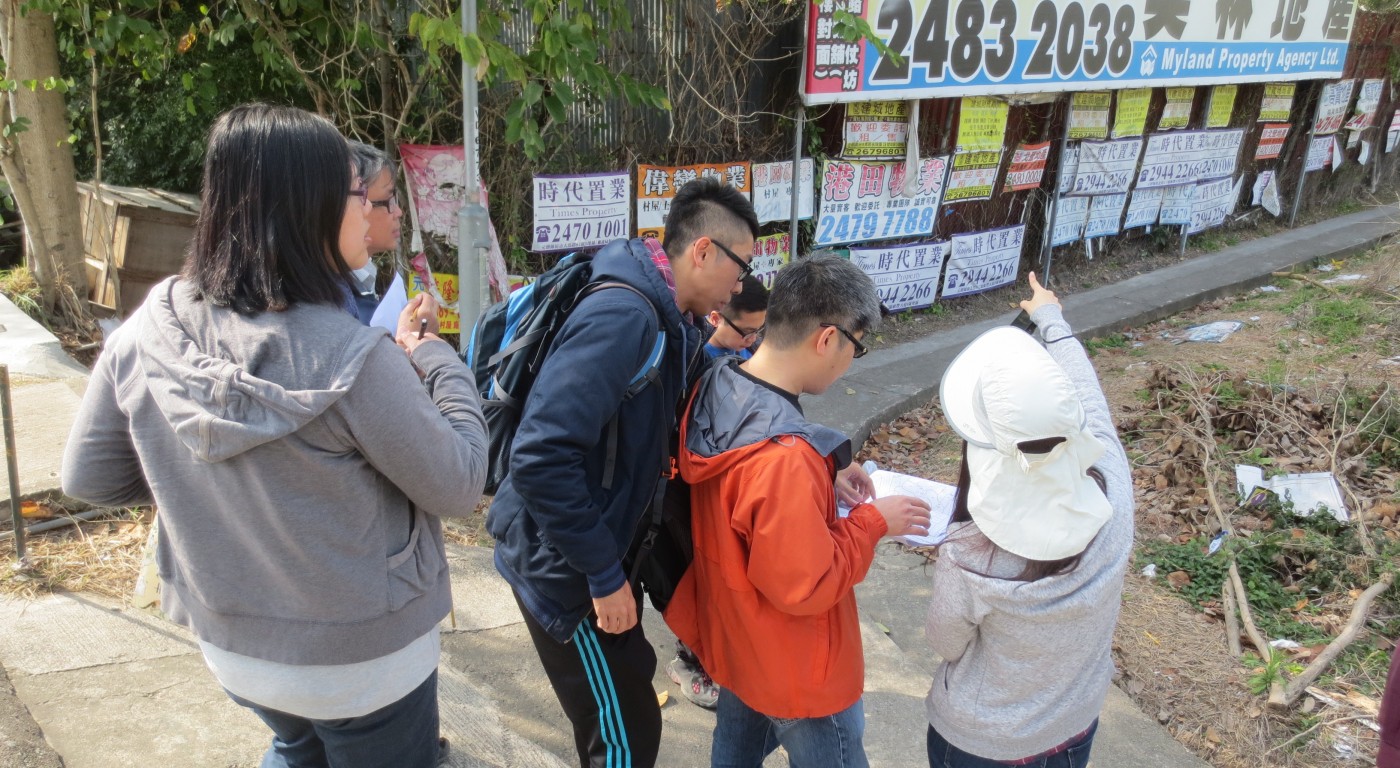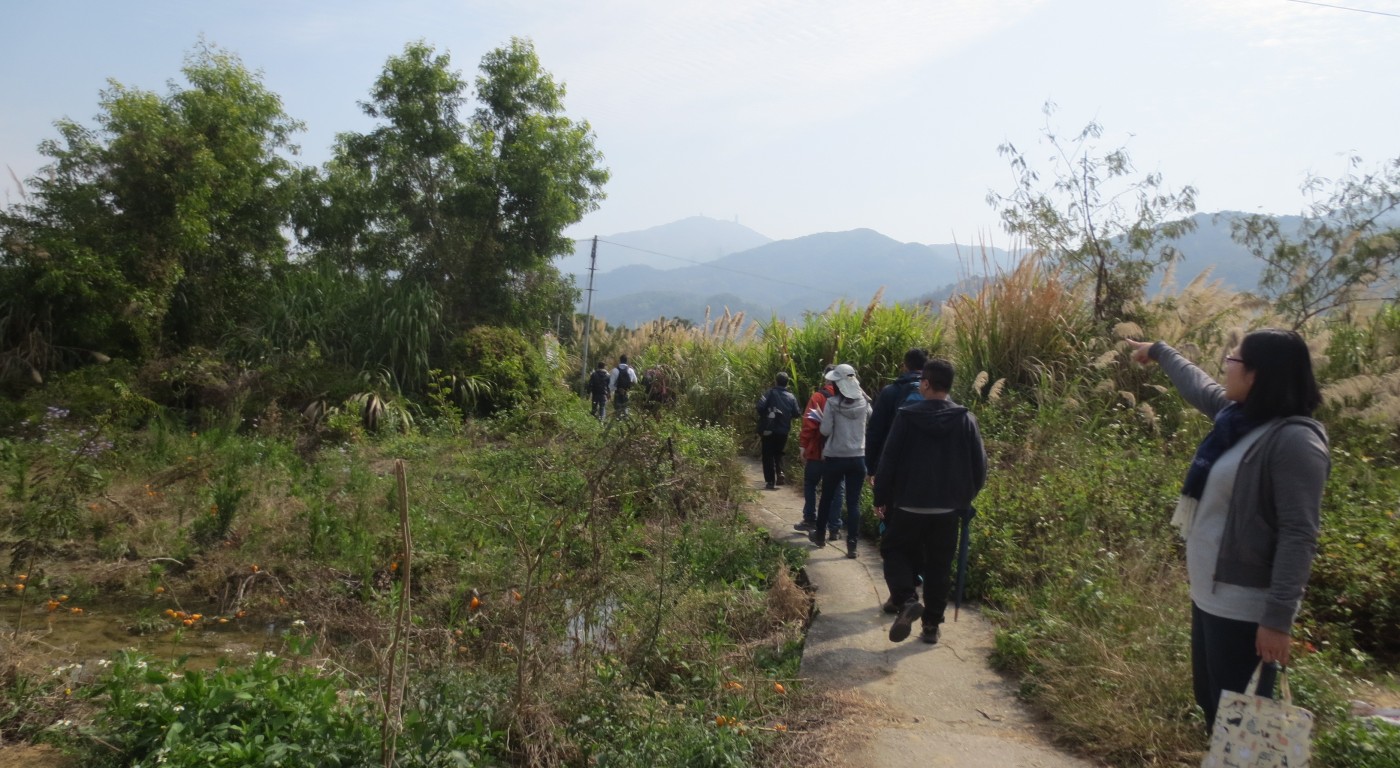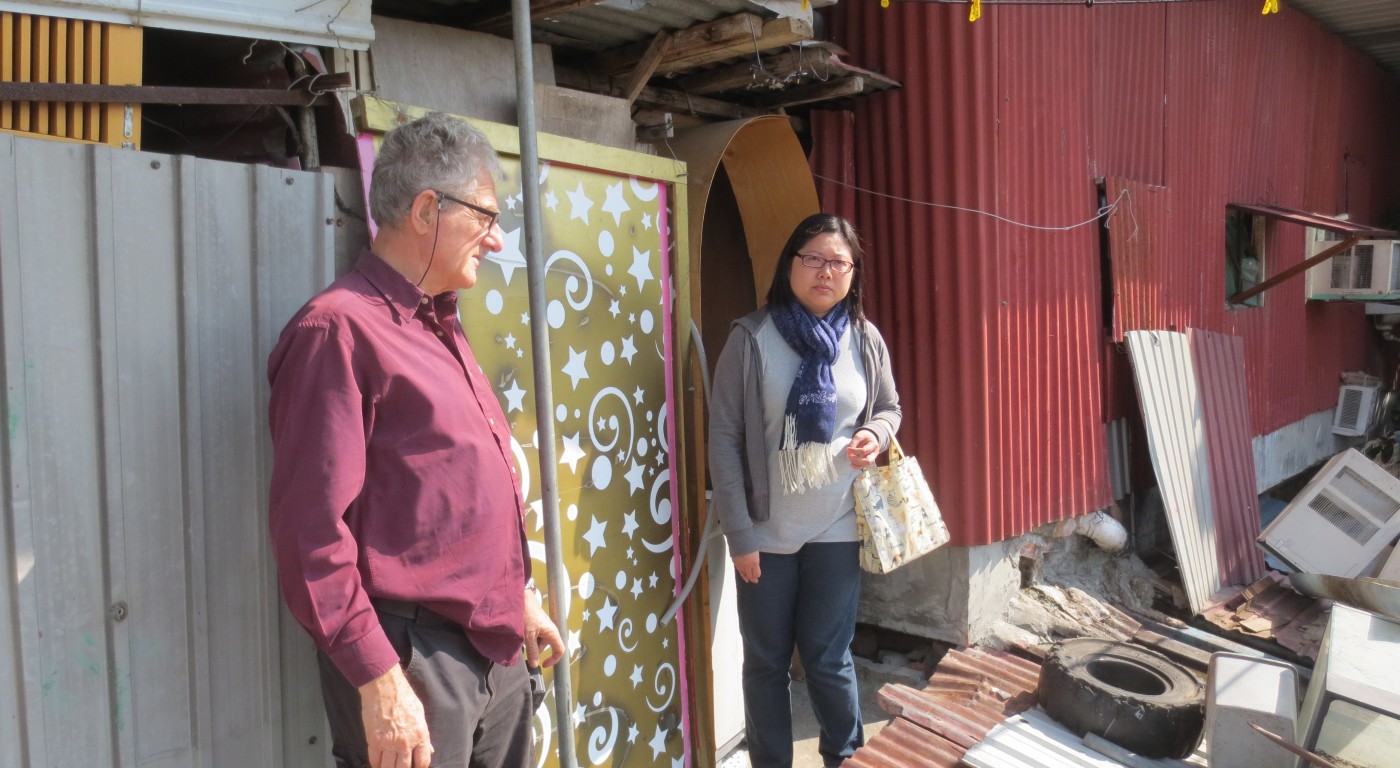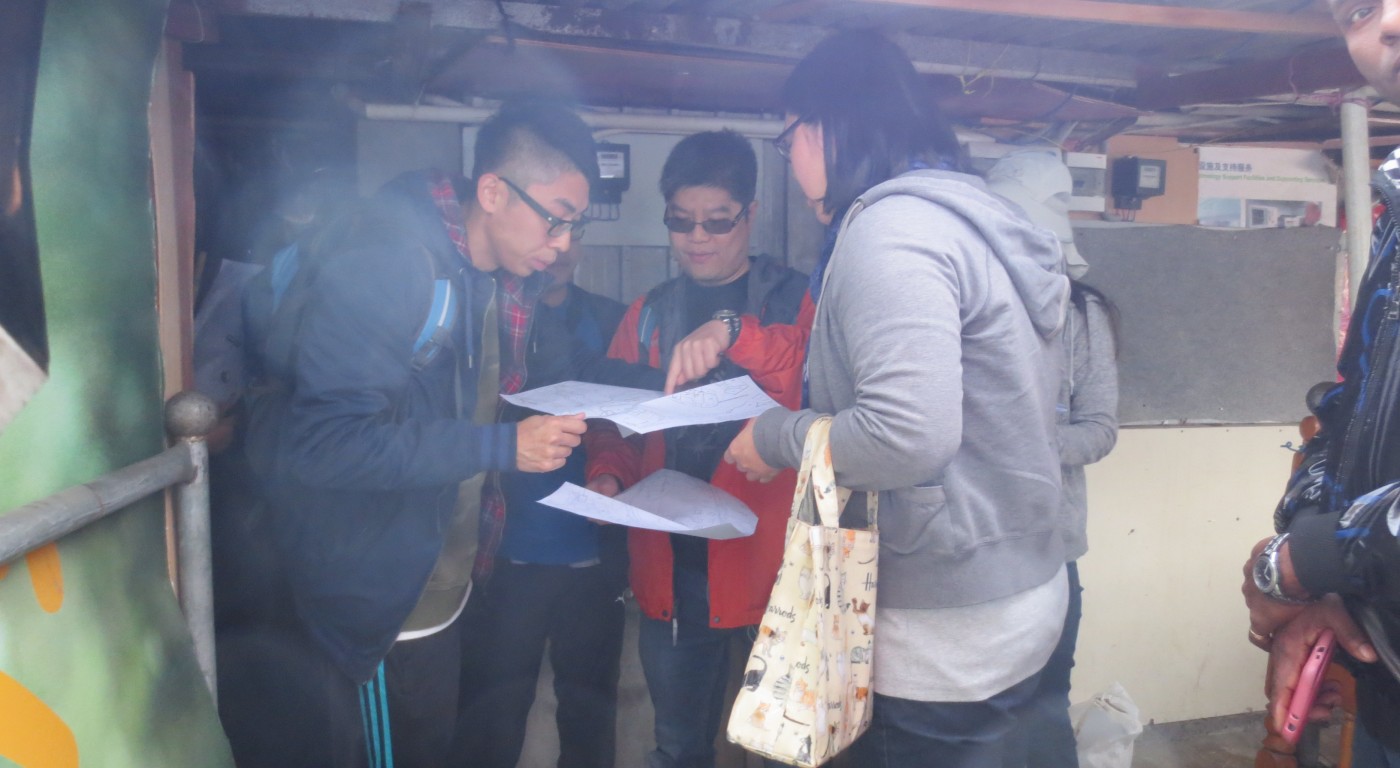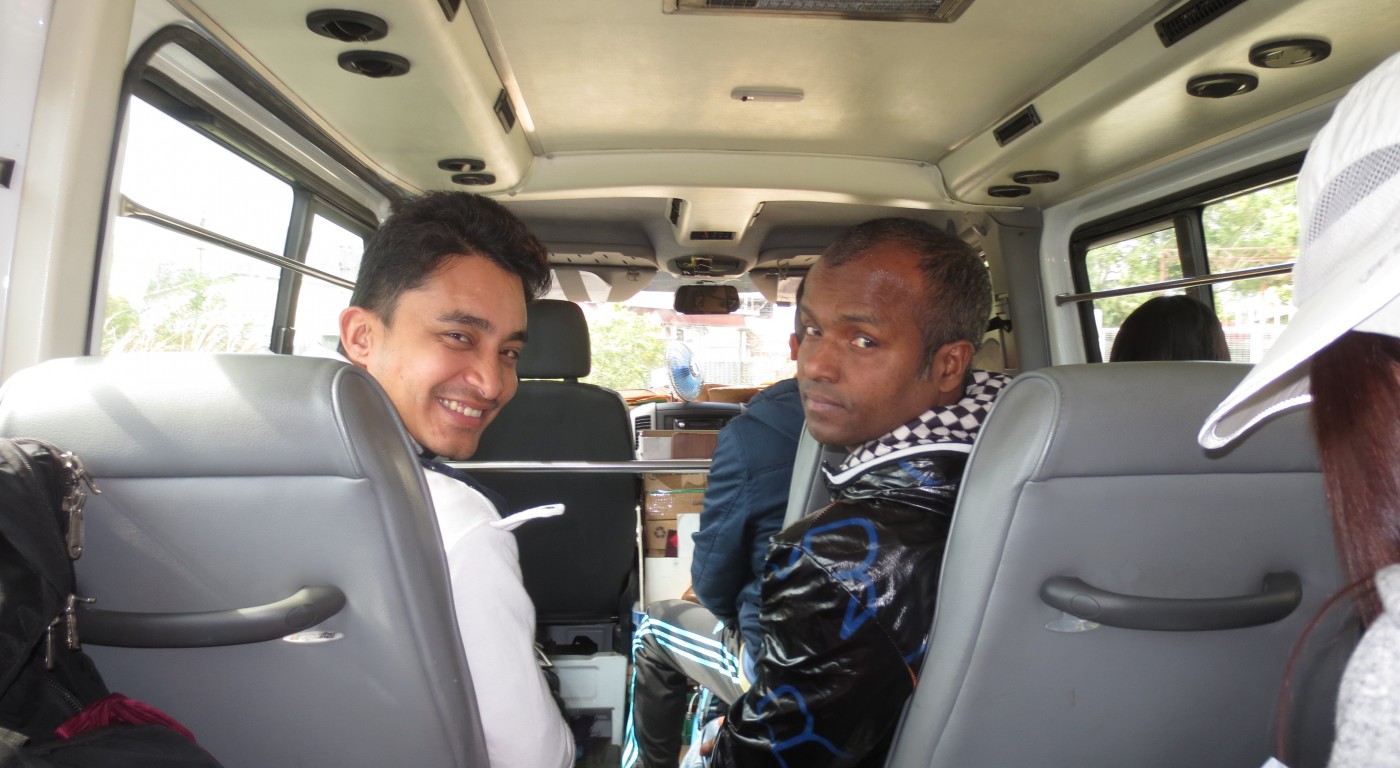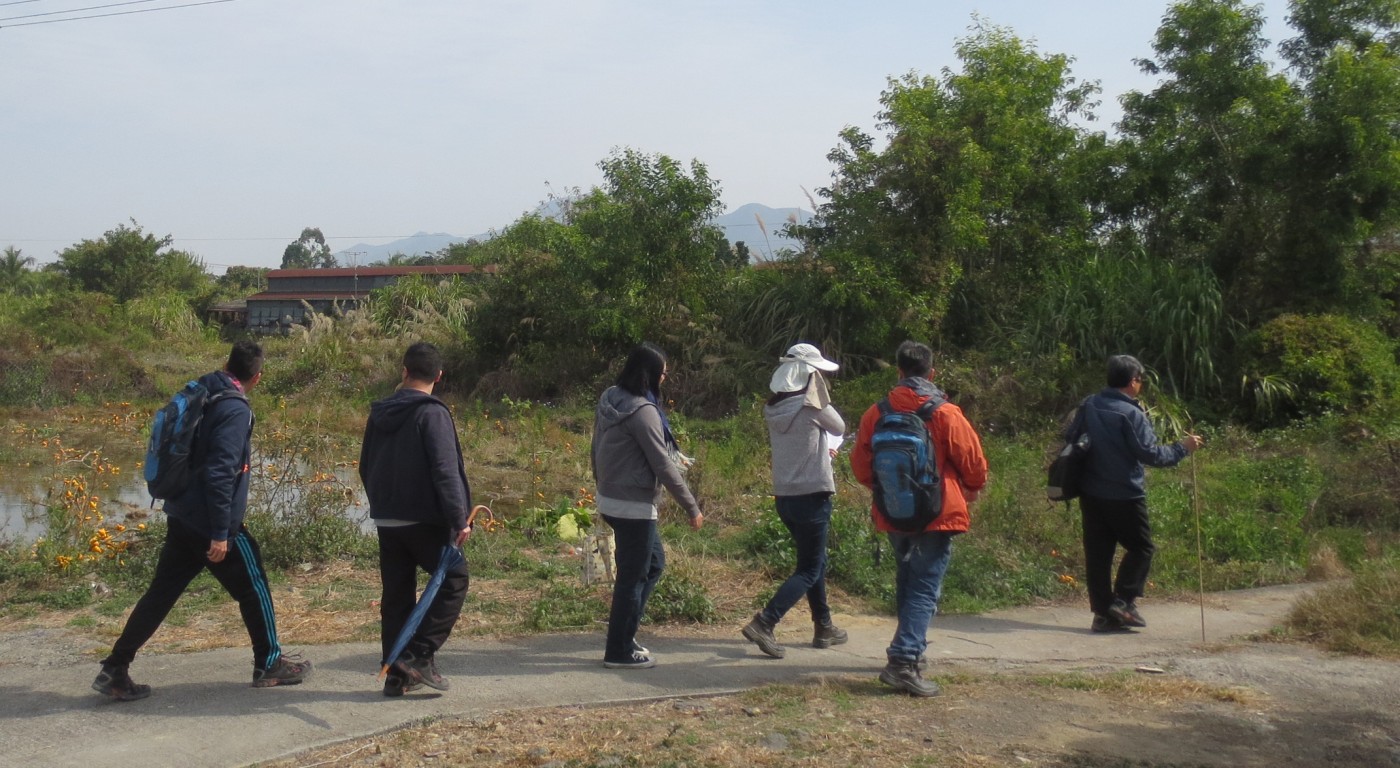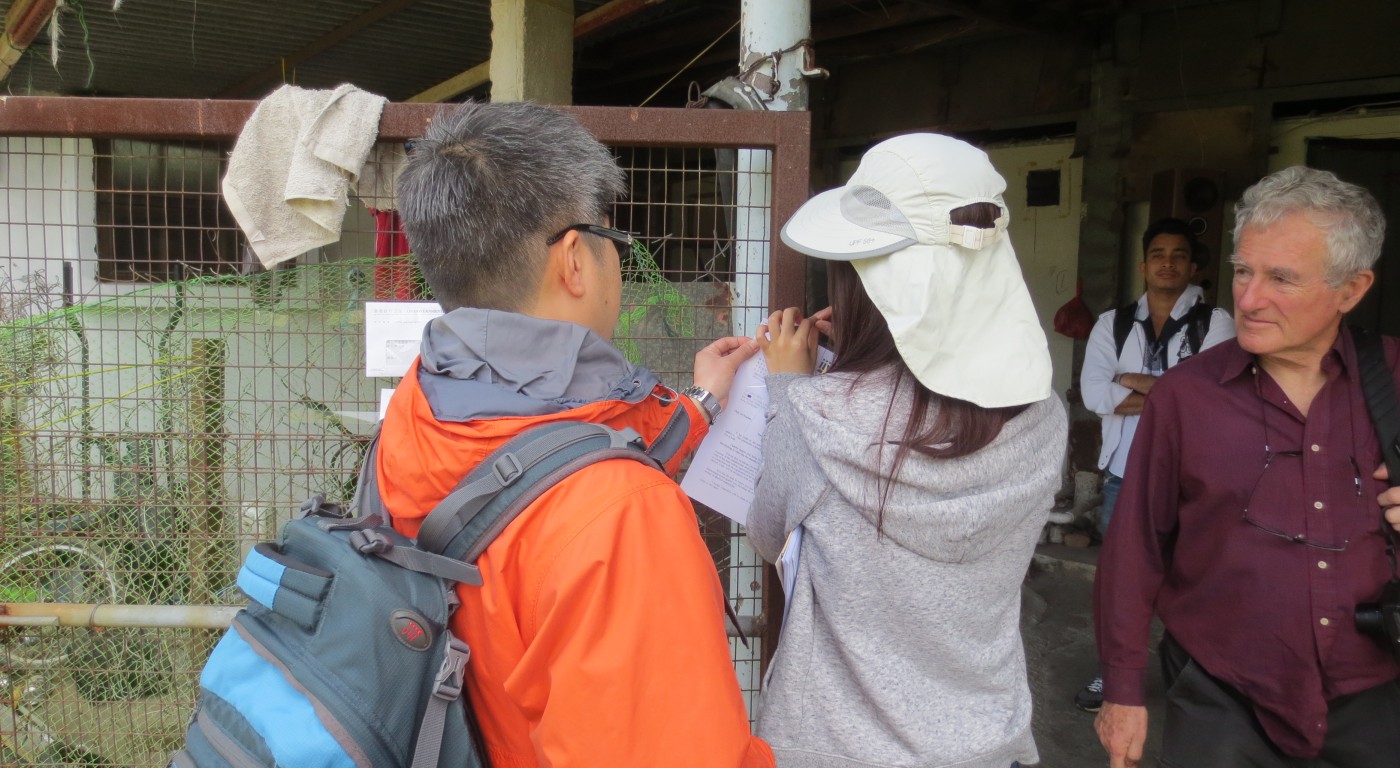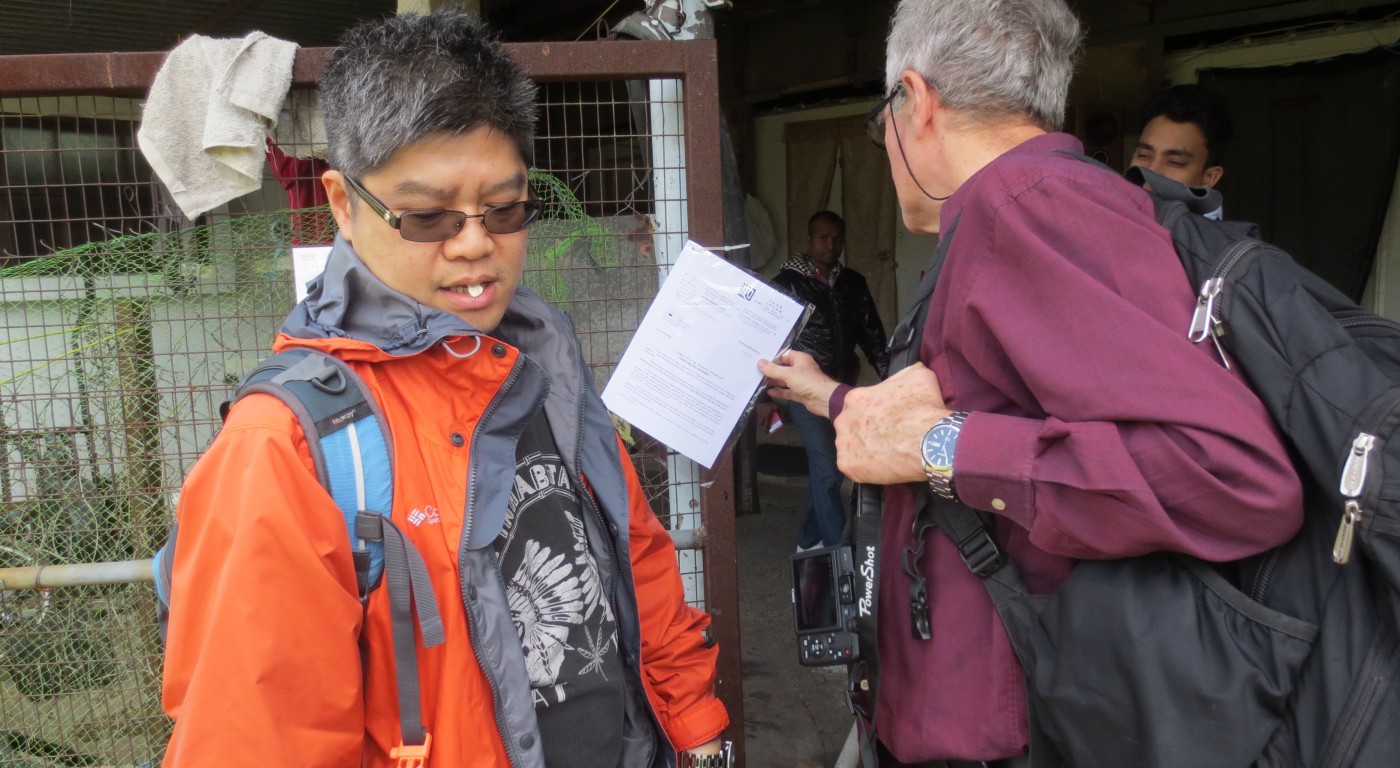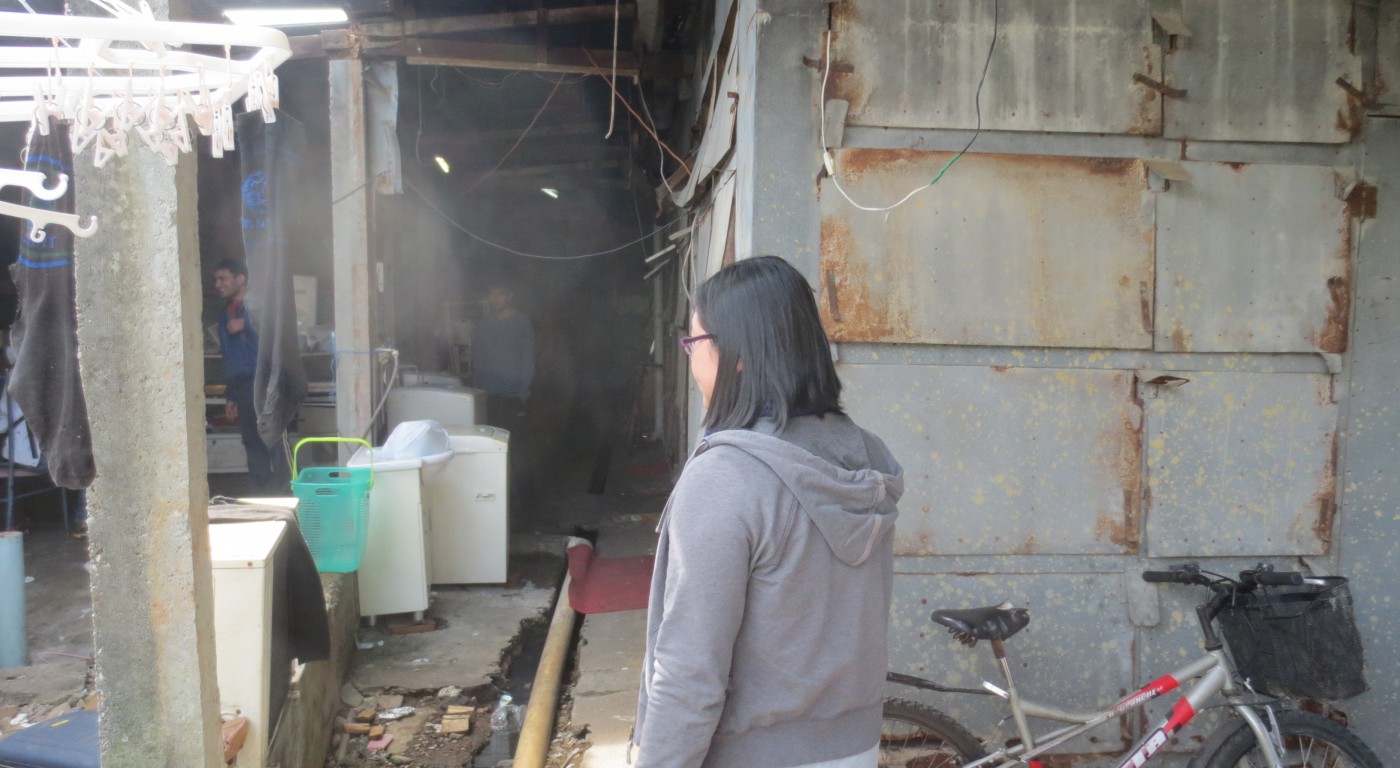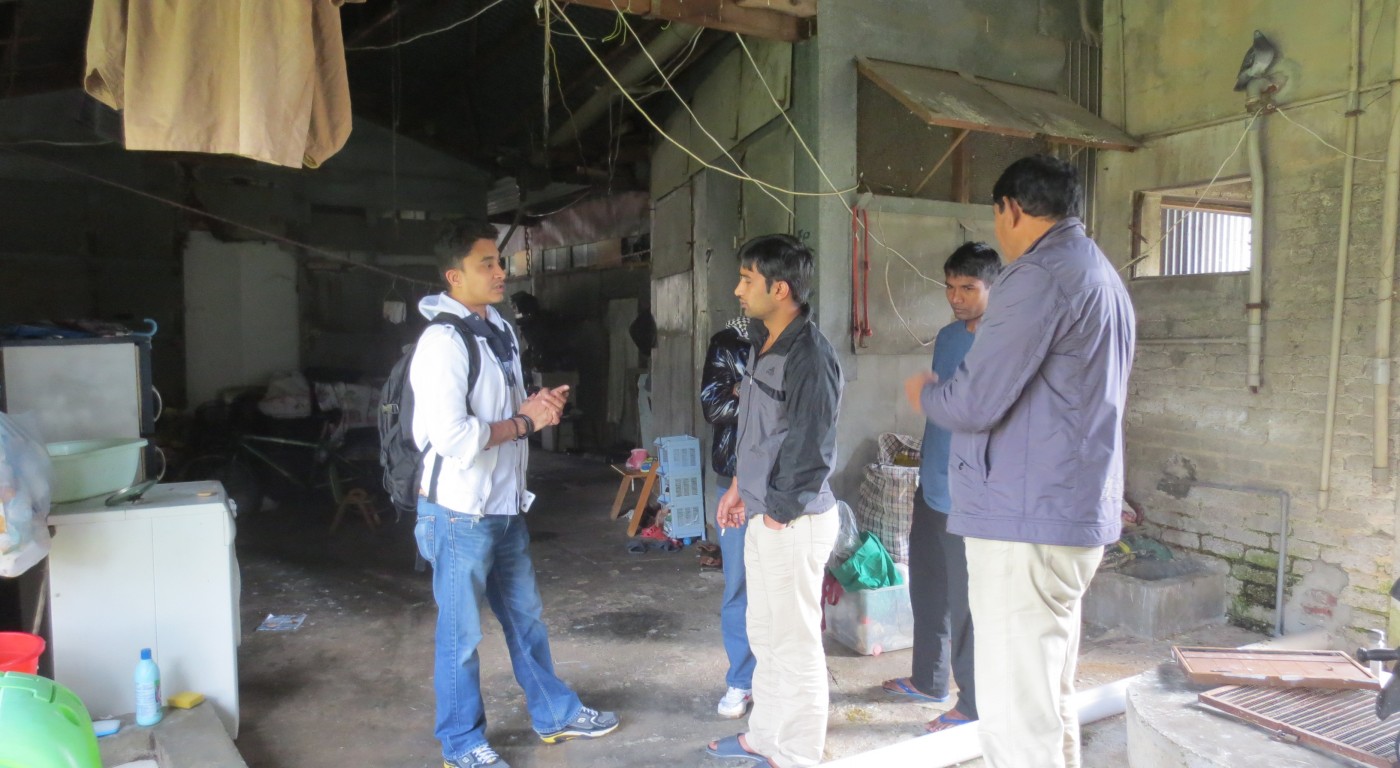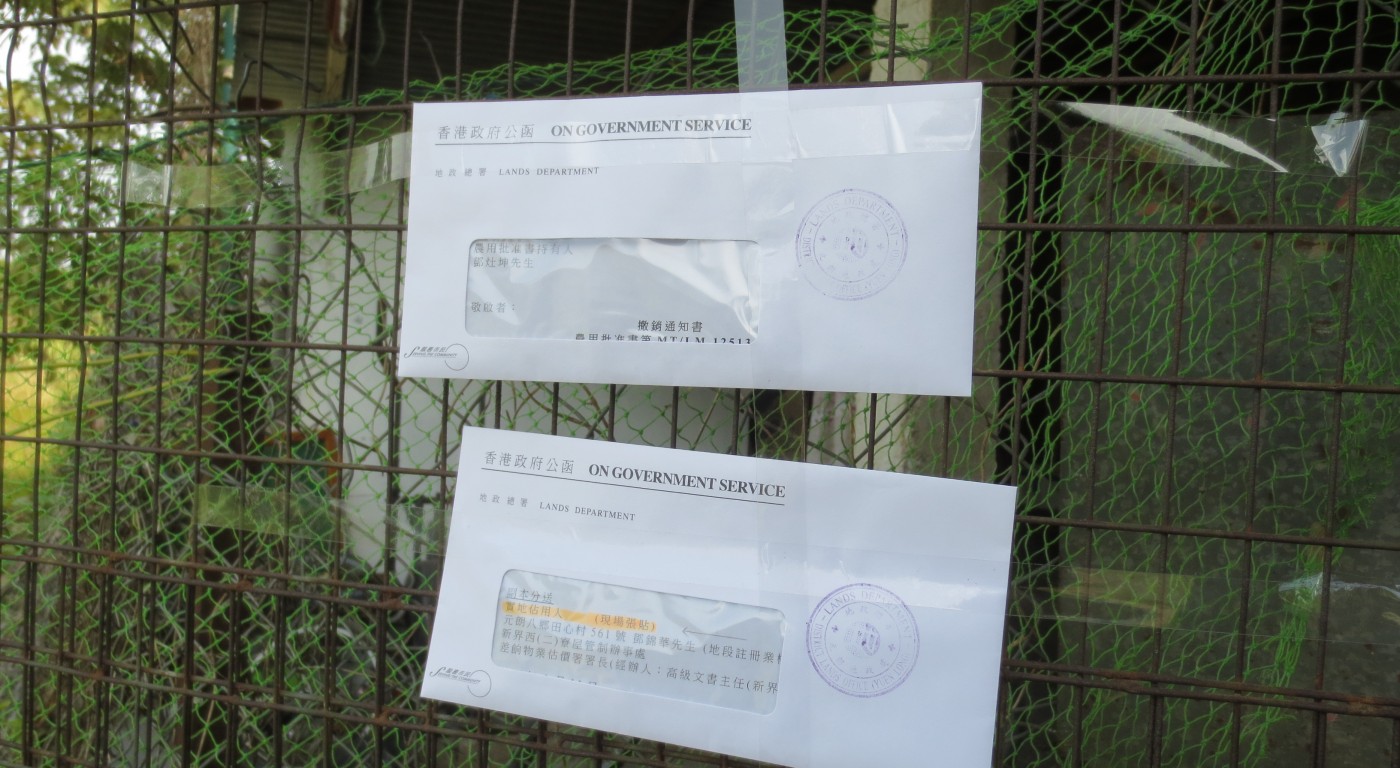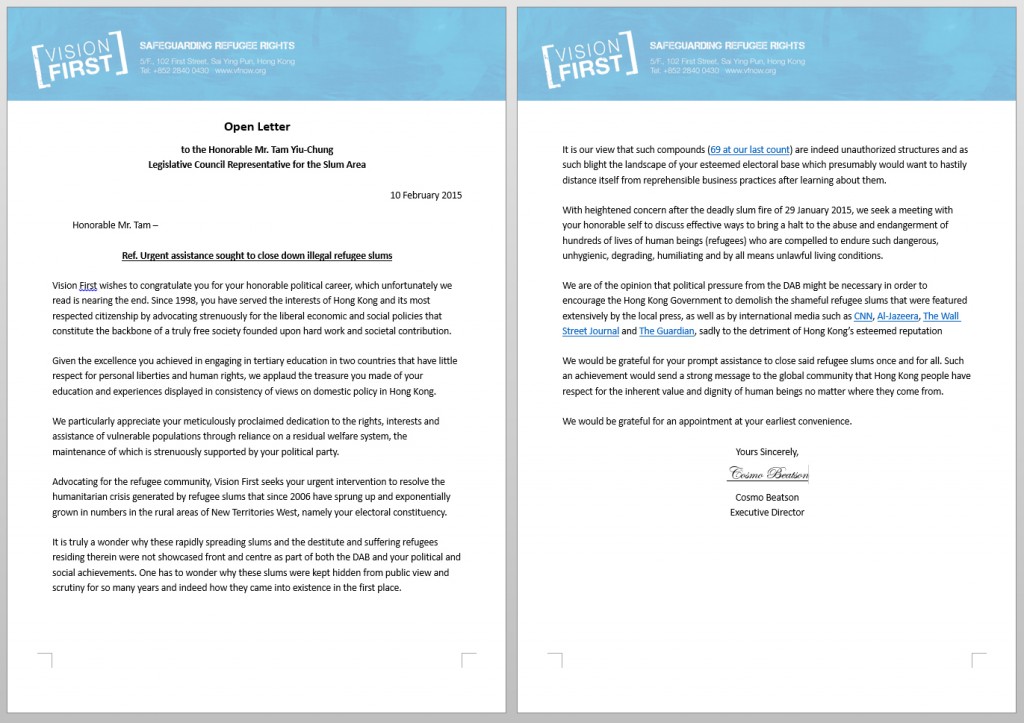RU proposes caseworkers sign leases
Feb 24th, 2015 | Housing, Refugee Community, Welfare | Comment
The Refugee Union floated a new idea as reported by a recent post on Facebook. The SWD or ISS-HK should sign the lease agreements with landlords to house refugees. The proposal makes perfect sense because refugees:
- Are entirely and passively dependent on welfare;
- Did not determine the rent assistance of 1500$;
- Have no savings or income to handle economic transactions;
- Are prohibited from working under threat of 15-22 months jail;
- Have no bargaining power with landlords and agents.
The Hong Kong Government ensures that refugees suffer destitution with the aim of avoiding the creation of a ‘magnet effect’ that would encourage others to seek asylum in the city. As such, the authorities are responsible for their lodging, food, clothing and medical services of this group.
Given that refugees often scramble for cash to purchase necessities such as cooking gas and shoes, it is unreasonable to expect penniless people to sign a 12 to 24 month tenancy agreement for residences that, in today’s market, typically cost more than 2500$ when assisted with only 1500$.
No wonder estate agents and landlords are loath to rent properties to refugees. Property owners expect to be paid rent monthly and don’t appreciate chasing tenants for payments which might be indefinitely delayed due to lack of income. Who in his right mind would rent his property to an unemployed individual who has no savings and work rights?
By deciding that refugees should not work, the government denied the entire group participation in solving the problems relating to their livelihood. By doing so, the authorities effectively reduced them to ‘children of the state’, who can do nothing more than beg from charities and well-wishers. If that is the nature of seeking asylum in Hong Kong, then refugees are 100% dependent on the state.
There are other advantages to having caseworkers secure and sign lease agreements. First, they would experience the stress of flat hunting with a laughable 1500$ budget. Second, they would appreciate negotiations with wary agents and landlords unsure who will foot the bill. Third, they might become advocates for a better housing policy as they clash against the inadequacy of current arrangements.
It seems that refugees have had enough of the housing games and want caseworkers to handle the impossible task of renting rooms for a 1500$ budget and dealing with the complications that arise from forced cohabitation when several individuals share a tiny room. The question is how will refugees compel caseworkers to step into this minefield?
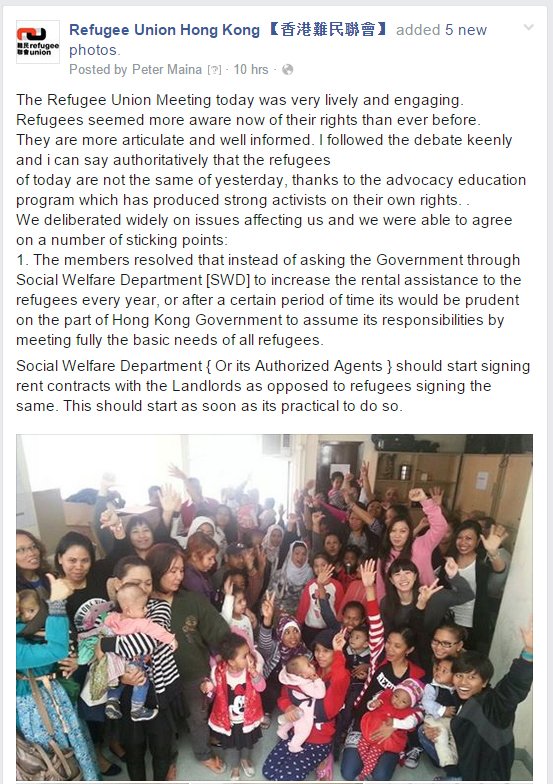
Homeless refugees demand proper housing
Feb 18th, 2015 | Housing, Refugee Community, Welfare | Comment
On 17 February 2015, a group of 60 refugees protested at the Social Welfare Department head-office with yet another chorus of complaints to demand greater scrutiny of the current housing crisis that followed the clampdown on refugee slums.
For the third time in a month refugees evicted from illegal huts and shacks made it clear to SWD officials that they are boxed in on four sides:
- They are not allowed to work and are jailed 15 to 22 months upon conviction;
- The 1500$ rent assistance is wholly insufficient in the current housing market;
- Land authorities demand the purging of slums triggering mass evictions;
- Guesthouse rooms are no longer offered as an alternative to homeless refugees.
Pressured by slum lords to leave and unable to secure cheap rooms, 21 refugees represented a hundred colleagues in the slums of Yuen Long and Kam Tin and demanded an urgent and lasting solution to housing needs. They were joined by several homeless refugees from Kowloon and supported by refugee activists and Vision First to lodge formal complaints with SWD social workers.
However, when told that grievances would be referred back to ISS-HK caseworkers, the protesters became agitated. Refugees accused SWD and its contractor of shifting them around, telling refugees in Yuen Long there were rooms in Kam Tin and vice-versa, when inhabitants from both areas sat side-by-side and were familiar with housing prices and shortage.
It was reported that ISS-HK had raised justifications with SWD by accusing the affected refugees of being ‘uncooperative and refusing to accept offers’. But refugees demanded that caseworkers bring such offers to SWD HQ and explain location, occupancy and rental, on top of the legality of certain arrangements. SWD replied that it wasn’t necessary for ISS-HK to bring over the ‘master list’.
It is worth noting that the one refugee who could have died in the blaze that killed Lucky, was lodged by ISS-HK in a guesthouse the next day and not asked to leave. However his colleagues from the same slum, whose huts did not go up in flames, had their rent stopped and faced eviction. Does this point to a government policy to offer guesthouse rooms only to refugees who had a near death experience?
To great consternation and frantic activity in the SWD head-office, the stand-off continued till evening. The press arrived followed by the police. After failing to mediate and suggesting that ISS-HK join the negotiations, the police noted that the protest was peaceful and there was nothing more they could do, so they left. The protesters were preparing to start an occupation and considered options.
Then a senior SWD officer unofficially agreed that the guesthouse solution would not be scrapped, but kept as one option in the protocol in the winding down of slums. An adjustment period is necessary for refugees accustomed to spacious yet dangerous and illegal slum rooms, to transition to multiple-occupancy in apartments. A degree of flexibility and respect is owed to slum-dwellers who were neglected for years in dangerous slums and suddenly evicted.
Further it was accepted that traumatized refugees, and those with medical conditions, should not be threatened with eviction when they fail to secure 1500$ rooms, or refuse to share with strangers, until lasting solutions are identified.
It is hoped that this wave of protest brought home to officials that genuine ‘case by case assessment’ does not equate with stopping rent to force vulnerable refugees overnight into shabby dormitories. This might be unavoidable when rescuing 2000 migrants in one day, but it is unpalatable for veteran refugees such as these protesters who have called Hong Kong home for 5 to 10 years. The guesthouse solution should remain available until suitable flats are secured, least homeless refugees take to the streets again in greater number.
I came to Hong Kong to save my life not work
Feb 17th, 2015 | Housing, Immigration, Personal Experiences, Welfare | Comment
I am a 30 year old South Asian who escaped the breakdown of law and order in a country where corruption protects the powerful who commit crimes with no fear of arrest or prosecution in court. It is meaningless for HK Immigration to claim, “You failed to report the incident to the police [in your country]”, because protection is guaranteed to the highest bidder, not to victims.
One night in 2010 I was smuggled on a speedboat from China to Hong Kong with ten other people. We were very lucky because the next day a powerful typhoon struck and the dangerous crossing could have been deadly. I was very scared at sea on a flimsy fishing boat in pitch darkness. At one point we were hit by a huge wave and we thought we would die.
The smugglers landed us on the coast and told us to walk into the mountains to find the road. They didn’t come with us and we got lost walking at night. For seven days we roamed the mountains in Sai Kung Country Park. We had no food and drank from the streams we crossed. We were relieved when the police arrested us because we were desperately hungry and afraid we wouldn’t make it.
For five years I have been suffering as a refugee. The rent and food we receive is not enough. I have lived three years in the slums, the only place I can rent a room for 1500$. I used to work to pay for a village room, but I suffered a serious injury in the container port. A wave struck the container barge we were offloading and a cargo chain detached and snapped my right arm.
I have heard about two refugees who died under falling containers. I doubt there were any inquiries into their deaths or safety procedures were reviewed. Bosses give refugees dangerous jobs because they know we cannot complain and they won’t have to pay for damages if we get hurt. I did not come to Hong Kong to die, but to live. I risked my life coming here and also working to survive.
Last week my ISS caseworker (name withheld) told me not to protest. He said that a big officer would visit the slums and I should not join the demonstration for safe housing. I stayed in my hut and waited. The big officer did not come. I think ISS tried to block the protest because they don’t want us to talk about our suffering. ISS tell me to find a legal room for 1500$, but they know it is impossible.
I only get some food and 1500$ rent from ISS. In five years they gave me nothing, then last week they gave me a green blanket. I waited five winters for one blanket! Everything I use I collected from nearby garbage dumps where I go on Saturday nights after residents dump old things. If I didn’t, I wouldn’t have clothes to wear, a bed to sleep on, a fridge to store food and a stove to cook.
I am not an economic migrant. I came to Hong Kong to save my life, not work or be a beggar.
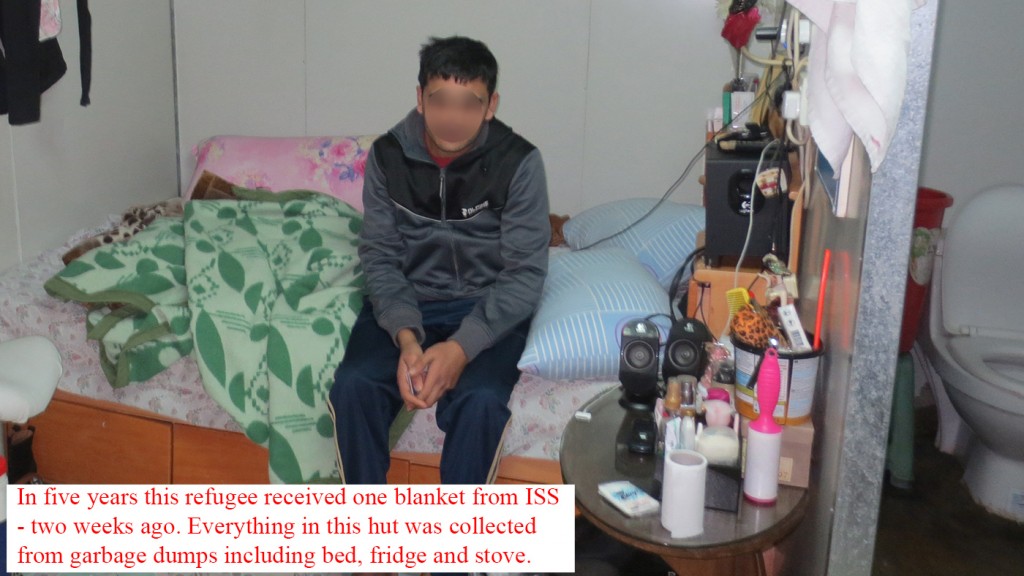
Will SWD support a sick refugee made homeless?
Feb 17th, 2015 | Housing, Personal Experiences, Welfare | Comment
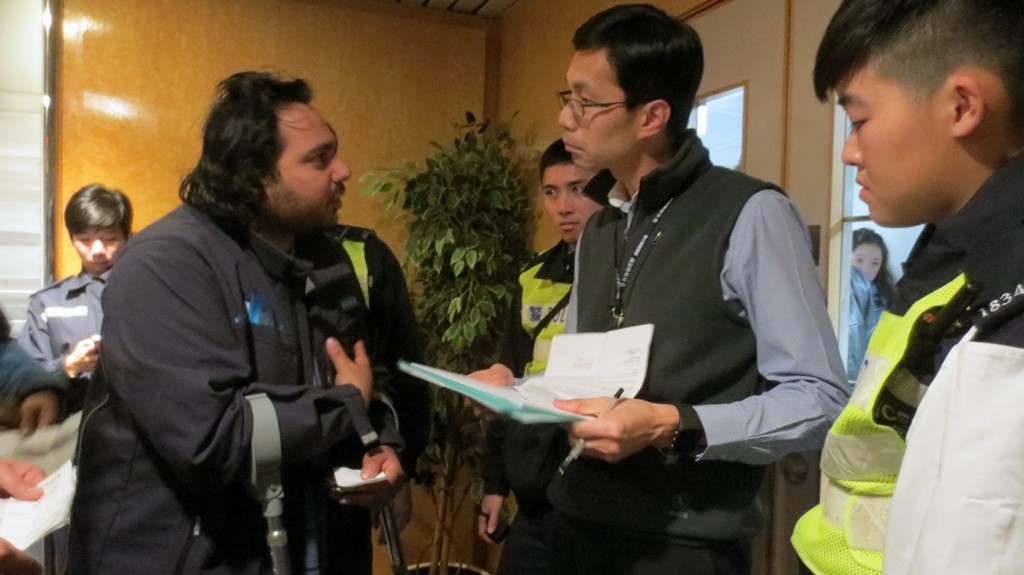
Joint slum inspection with Lands Department
Feb 14th, 2015 | Crime, Housing, Welfare | Comment
On 13 February 2015 Vision First conducted a joint slum inspection with a team of lease enforcement officers of the Lands Department, who are tasked to identify unauthorized structures and take enforcement action against registered owners in flagrant breach of lease covenants.
Following the slum blaze in which a Sri Lankan refugee was burned to death, the government approach towards and tolerance of refugee slums appears to have markedly changed. It was regrettably predictable. Vision First campaigned vigorously against hazardous slums advising officials to prudently take preventive actions against dangerous structures before the loss of life and property.
The lead Land Executive confirmed that the present compound at the Slum on two Storeys, the site of the fatal fire, was in breach of the land lease. She explained that the Squatter Control Survey only classified three small huts as “tolerated structures”, erected prior to 1982 and marked “TS” on Lands charts (red ellipse), and those shacks no longer exist.
The Lands executives were shown around the slum and spoke to resident refugees. They were lead to the back of the second storey where the most hazardous cubicles are not easily accessed. It was confirmed that enforcement action started after the fire and warning notices had been posted on 11 February 2015. Lands was yet to hear from the registered owner.
The appalling living conditions – dreadful waterless toilets and bathing buckets in particular – raised grave concerns with the lead officer who asked, “Has the Social Welfare Department visited this place?” She was surprised to learn that her colleagues at the SWD had never visited any of the refugee slums they supported through contracted agent ISS-HK. She assured Vision First that she would refer this case to the SWD and Fire Services for follow up.
We shared a ride in the Lands van to the nearby “Slum that rose like a Phoenix”, which takes its name from a previous blaze and was reported by Vision First on 20 November 2013. We witnessed the Lands executives posting a notice on the perimeter fence 450 days after our original blog. The notice warned that present structures are in breach of lease conditions and must be purged within 28 days to avoid further lease enforcement action.
The lead officer confirmed that following a public complaint, Lands had inspected the site last week and identified unauthorized structures in which dozens of refugees appeared to have been living for some time. She questioned the appropriateness of such arrangements on agricultural land that were not tolerated. She further explained that the government will reenter the land if the registered owner fails to demolish the offending structures in a month’s time.
Affected refugees are gravely concerned about the prospect of being suddenly evicted, though they generally appreciate that short-term discomfort (moving to guesthouses or dormitories) is preferable to years of living dangerously in structures that could as easily collapse as erupt in a ball of fire like Lucky’s hut. Death has a way of focusing attention on what is most important in life.
Vision First emphasises that securing adequate housing for refugees is a government duty, not a task for penniless refugees without savings and work rights. Few doubt that Hong Kong Government is at fault if it fails to meet the legal requirements of the High Court “Usman Butt” case (HCMA 70/2010):
“A genuine torture or refugee claimants deserves sympathy and should not be left in a destitute state during the determination of his status. However, his basic needs such as accommodation, food, clothing and medical care are provided by the Government” – Justice Cheung.
VF Report: the Slum on Two Storeys closes down
Feb 13th, 2015 | Crime, Housing, VF Report, Welfare | Comment
The LegCo “Panel on Housing” of 2 November 1998 states “Any illegal structures or extensions built after 1 June 1982 on … leased agricultural land without the approval from the Lands Department, are classified as squatters and are subject to demolition as and when they are discovered. Structures registered in the 1982 Squatter Control Survey are tolerated until such time when their removal is required for public development, environmental improvement or safety reasons.”
On 11 February 2015, the Lands Department affixed this notice at the Slum on Two Storey, the site of the fatal fire. The registered owner is notified that three metal and wood structures of specific measurements had been tolerated. However such structures had been previously demolished and replaced with the current unauthorized structures, thus cancelling the squatter license. In other words, the entire compound is found to be illegal and must be returned to agricultural use.
A quintessential expression captures the moment – closing the stable doors after the horses have bolted. Since May 2013 Vision First has advocated tirelessly for safe and proper housing for slum refugees by reporting our findings to departments including the land authority. Two weeks after the death of a refugee squatter, lease enforcement commenced against an unscrupulous slum lord.
It appears that not all government departments are reading from the same page. On the one hand Lands Department publicly stated that several refugee slums are illegal and posted notices at certain location. On the other, the Social Welfare Department did not concede that rules and regulations were broken by settling refugees in slums since 2006. Truth would go a long way in resolving the issue.
Meanwhile the Hong Kong Police is apparently attempting to maintain order in a familiar way, namely gagging refugees from voicing grievances. Whether coordinated or the result of individual opinion, a Refugee Union leader affirms he was visited by four police officers in his tin shed at night and warned that he should not join an upcoming protest. Another refugee in a different slum was told by a policeman, “Why you complain? You have a good room”. The officers were met with silence as pajamas were not the right attire for a debate.
At this juncture, the government should be coordinating and implementing a rational clearance of dangerous slums. Priority should be given to locations with high fire hazard from which refugees ought to be urgently moved to guesthouses while permanent solutions are identified. It is meaningless for caseworkers to instruct refugees to immediately secure proper accommodation for 1500$ a month!
Refugees were victimized when they were first settled in slums years ago. Today they are victimizes again by sudden evictions. It is a no-brainer that 1500$ legal rooms do not exist and refugees have no resources to pay for rent surplus, since they are not allowed to work. Something is amiss in the government’s strategy to resolving this housing crisis in which everyone is responsible, and not only the refugees as pro-government propaganda states.
The above mentioned paper concludes, “It is the Government’s policy that no one would be rendered homeless as a result of the clearance programmes. When clearance is to be conducted in a squatter area, all persons … will be rehoused to public rental housing or interim housing units according to their eligibility.” Current practices again shamefully belittle the dignity and humanity of refugees.
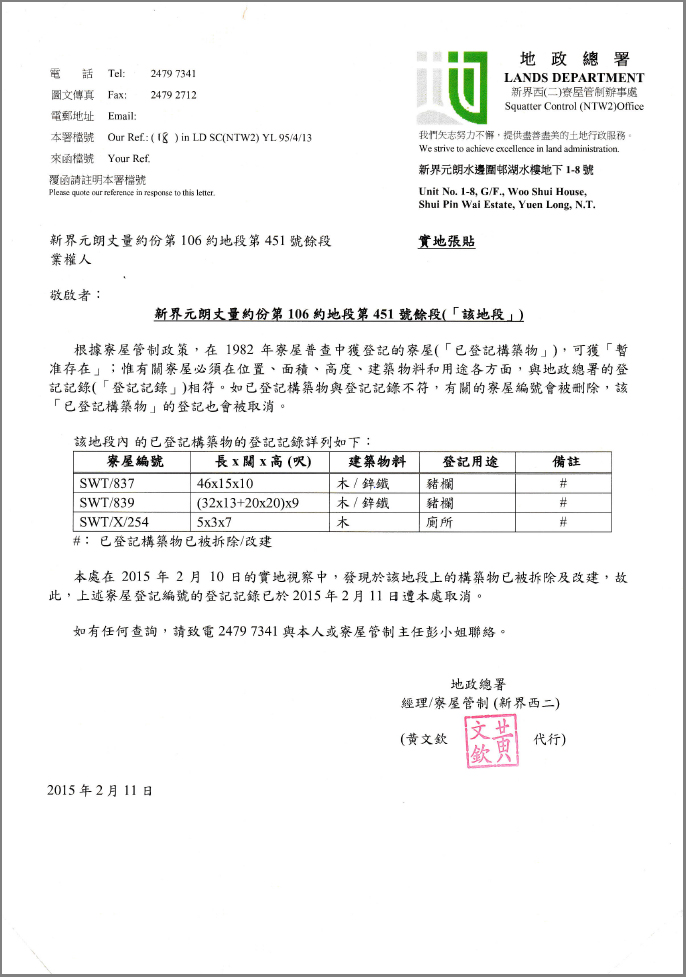
Hong Kong needs sustainable solutions in refugee policy
Feb 11th, 2015 | Housing, Immigration, VF Opinion, Welfare | Comment
Rose is a refugee mother living in the slums. She was distressed speaking to us, “My officer no give money to the landlord from 1 February. The officer said ‘Danger the place. You find another room. Rent money stopped paying already.’ Room outside very expensive. I must find another room, but I don’t have money. What can I do?”
Rose lamented, “If I leave and stay in ISS shelter where I put my property? I have double-bed, full kitchen and many bags of clothes for me, my husband and son. Landlord said we must pay cash for February rent or we cannot leave. [In her slum] landlord is asking 30 refugees to pay cash this month. He threaten everyone to pay before we leave.”
In September 2006 a South Asian refugee was settled in a pig farm by ISS-HK. His caseworker approved the arrangement with the landlord without inspecting the shack as Vision First reported in August 2013. A few months later ISS-HK relocated him to a guesthouse. Yesterday he was alarmed, “ISS said I must leave by Thursday. The cheapest room is 3000$ so where I find a room for 1500$. Where do I go? I am very afraid.”
Aziz is a vocal campaigner for better housing assistance for refugees evicted from the slums. He is unable to find a cheap enough room for himself and his wife. He reports, “ISS didn’t pay our rent in January and February. But ISS continue to pay for electricity and water. Why they don’t give more money to rent [better accommodation] than give it to the landlord? Officers from Lands Department tell to me this lot must all be demolished and turned into farmland.”
Richard is an African refugee settled by ISS-HK in a guesthouse 14 months ago when he was unable to secure a 1500$ room. He reports, “My caseworker said I must leave on Monday, but I refuse. Where I go? Do they want me to live in the street? ISS put me in a guesthouse when I was homeless a year ago. Today house prices are much higher and they still want me to find a room for the old price. What are they thinking? Refugees are not animals to kick outside …”
An SWD spokesperson responded to our bog “Housing crisis expanding to guesthouses” with this comment, “Thank you for your email of 6 February 2015 regarding the claimants living in guest houses arranged by ISS. We are looking into the matter and ISS has been alerted about it.” Something is not right. Isn’t the contractor implementing policies dictated by the government? Isn’t shifting responsibility to underlings cowardly incompetent to say the least?
Facts lead us to believe that the authorities caused the present housing crisis by a combination of (un)foreseen ramifications and unforgiving market forces. The time has come for the government to rethink their approach and the following constraints should be evaluated:
- refugees are not a temporary ‘problem’ to be fixed with residual humanitarian assistance;
- a work ban disempowers refugees from actively participating in problem solving;
- unrealistic rent assistance prices refugees out of basic rooms, exposes them to incarceration for working illegally while enriching unscrupulous citizens;
- after years of negligence the refugee slums are targeted for closure following Lucky’s death;
- lodging refugees in guesthouses for about 7000$ a month was ill-advised;
- the escalating housing crisis is a threat to social stability and public security that demands longterm, sustainable and reality-based solutions.
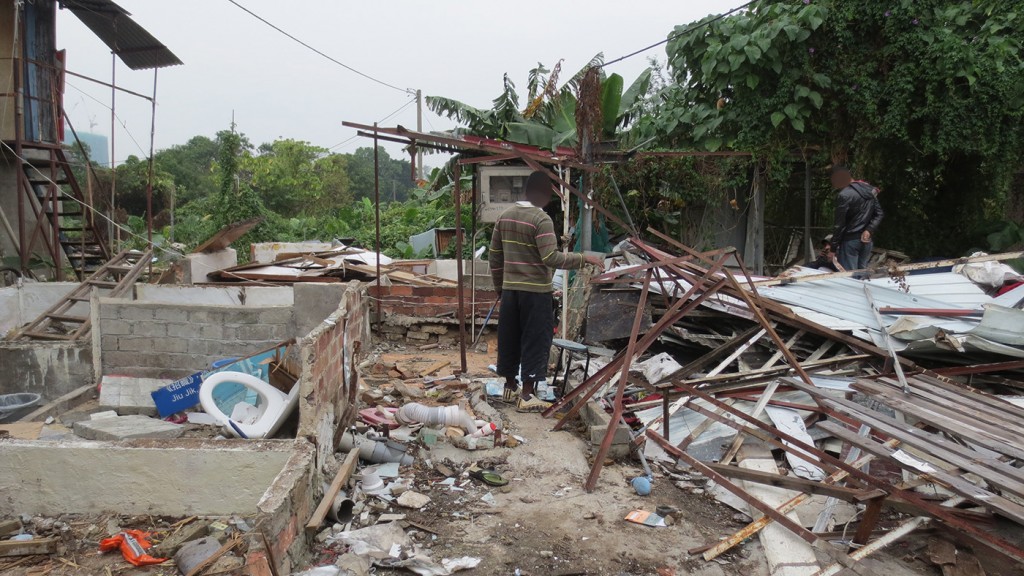
ISS-HK proactively pushed homeless refugees to slums
Feb 9th, 2015 | Crime, Housing, Welfare | Comment
Let us put ourselves in the shoes of newly arrived homeless refugees, presumably desperate to get off the street and secure a roof over theirs and possibly their family’s head. Refugees are generally informed by either the authorities or their peers of the bleak life they are going to live in Hong Kong.
New-arrivals will eventually be directed to immigration authorities, if not first arrested, and upon release register at one of the SWD Integrated Family Centers around Hong Kong upon. After a means assessment and a 3 to 4 month wait, they are referred to ISS-HK, the government contractor for the provision of welfare to asylum seekers and refugees.
Newcomers learn of further restrictions on their livelihood: not only are they banned from working and will be jailed 15 to 22 months for doing so, but the rent assistance provided is arguably half of market prices for the cheapest subdivided rooms in the most rundown buildings. The present rate is 1500$, but it was 1200$ at the time ISS-HK circulated the document below.
It is at that time that refugees end up either following their peers wherever they live, to tap into similar cheap housing, or they are provided by their caseworker with addresses where they may find accommodation. In this case, one caseworker briefed a desperate homeless refugee on the rigid 1200$ rent ceiling (at the time offering neither security deposit or agency fee) and proactively encouraged him to contact the purported landlords of item 5 and item 6, which were duly marked for attention.
Several critical observations leap forward:
- The rooms in slums are often conveniently priced around the level of rent assistance;
- Other rooms seem to be priced far beyond the reach of destitute refugees;
- “No proof of ownership” evinces knowledge of unauthorized structures and land use;
- Item 6 is annotated with “6 to 7 rooms” that the caseworker keenly promoted;
- Item 6 is annotated with “house owner rent the land” indicative of a middleman/facilitator;
- Item 6 is annotated with “new address not in accommodation master list”;
(The authorities ought to forensically analyses such master lists) - Items 3, 4, 5, 6 are identifiable by Vision First as known slums in those areas;
- Items 4, 5 and 6 indicate “washrooms” which are known to be water buckets;
- Items 4, 5 and 6 indicate “kitchen”, sample photos of which are displayed here;
- Destitute homeless refugees are cunningly forced towards the slums!
Vision First researched extensively the conditions and dynamics that pushed refugees into the 69 slums we identified. We were told by several purported landlords that the joint enterprise started with a connection at ISS-HK, details will be produced in due course. We believe that the documents with the contact numbers of 8 slum lords and the one below with the details of rooms at 4 slums, manifestly give the lie to any claim that ISS-HK had no part in a joint enterprise to settle refugees in slums. Some observers might go as far as calling these smoking guns.
Besides, whether it is admitted or not, nothing changes the fact that these slums are unauthorized structures never listed by the Lands Department for human habitation and as such should be promptly dismantled when those responsible wake up from a deep slumber.
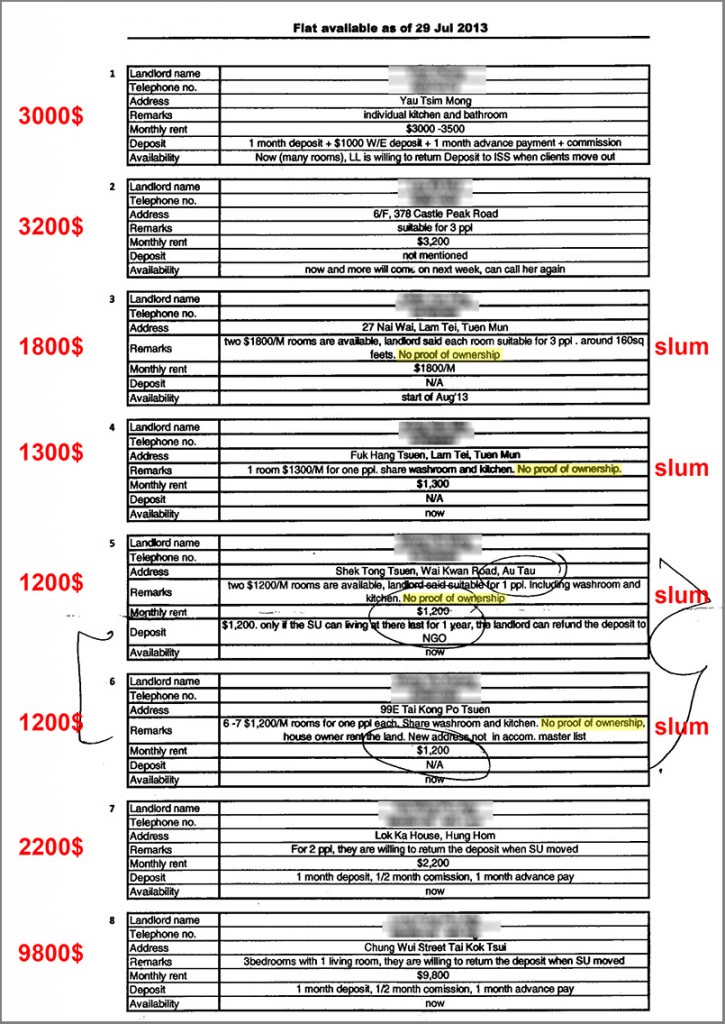
List of slum lords published by ISS-HK and distributed to homeless refugees
Feb 9th, 2015 | Crime, Housing, Welfare | Comment
ISS-HK published and distributed to refugees a document that provided slum lords’ names, mobile numbers and locations, with specific directions for public transport to arrive at such slums. This document was issued by ISS-HK and provided to refugees with instructions to reach Kam Sheung Road MTR station, board bus 64K in the direction of Tai Po and get off at Kam Tsin Wai bus stop (3rd stop). At this location there are no houses along the tree lined road. There are farms, car traders, scrap yards and, most importantly, the Slum on Two Storeys (the site of the deadly fire; 3 minute walk from the bus stop) and the Slum with The Price List (8 minute walk from that bus stop). Vision First has collected several testimonies from ISS-HK case workers directing service users to these slums. How does this evidence correlate with ISS-HK statement that refugees want to live in slums?
